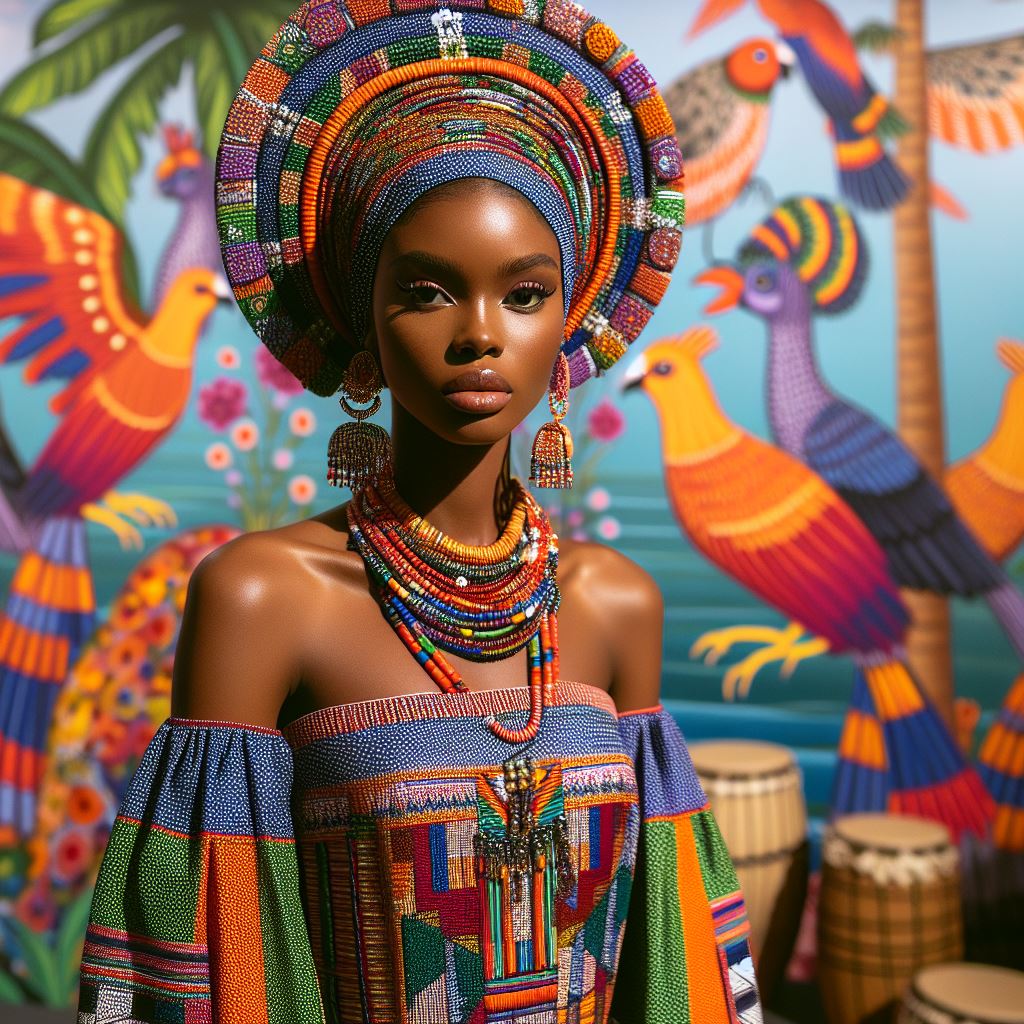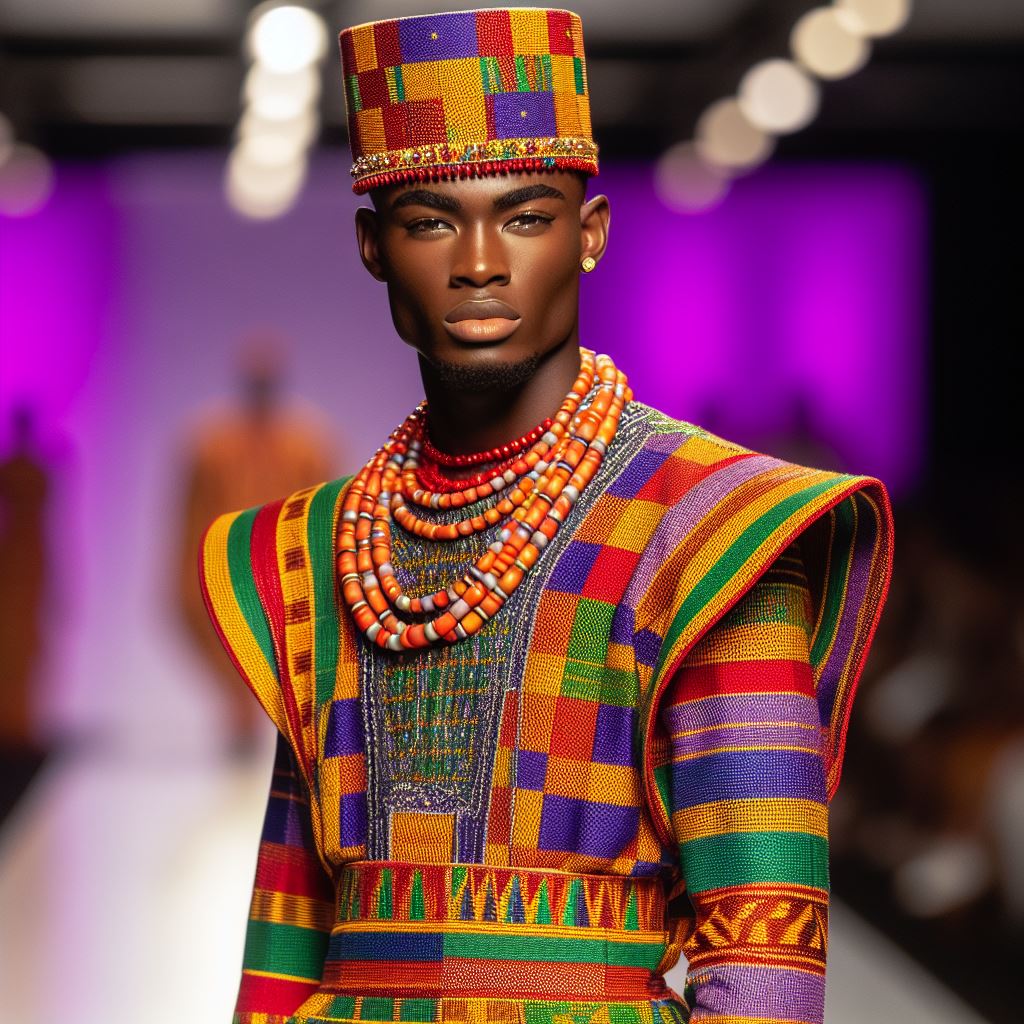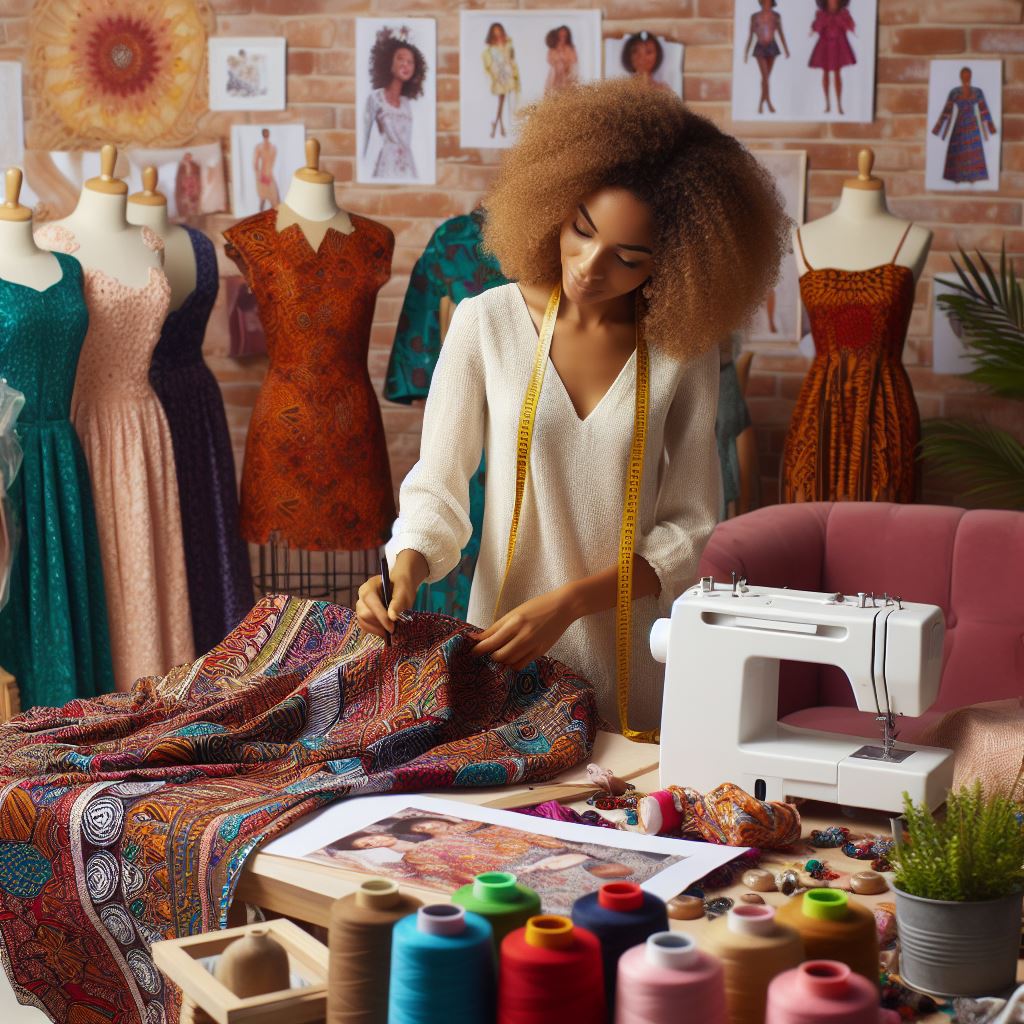Introduction
Nigeria’s fashion scene is a vibrant tapestry woven with tradition and innovation. From its humble beginnings to its current global recognition, the Nigerian fashion industry has undergone a remarkable evolution.
In the early days, Nigerian fashion was deeply rooted in cultural heritage, with traditional attire dominating the scene. Fabrics like Ankara and Aso-oke were cherished for their intricate designs and rich symbolism.
Influence of Colonialism
The colonial era introduced Western styles, merging them with local aesthetics to create a unique fusion. This period marked the birth of modern Nigerian fashion, blending traditional motifs with contemporary silhouettes.
The late 20th century witnessed the emergence of indigenous designers who championed Nigerian identity on the global stage. Icons like Deola Sagoe and Mai Atafo paved the way for a new era of creativity and entrepreneurship.
Today, Nigeria’s fashion industry stands as a dynamic force driving economic growth and cultural expression. With a burgeoning middle class and increasing internet penetration, the market is ripe for innovation and expansion.
Key players in the industry include established brands like Tiffany Amber and emerging talents such as Lisa Folawiyo. These designers showcase the diversity of Nigerian fashion, blending traditional techniques with contemporary flair.
Celebrities play a pivotal role in shaping trends and promoting local designers. From Nollywood stars to international musicians, Nigerian fashion has garnered attention on red carpets and social media platforms worldwide.
Afrocentric fashion has gained momentum, celebrating African heritage through bold prints and vibrant colors. Designers draw inspiration from diverse cultural influences, infusing their collections with a sense of pride and authenticity.
The advent of e-commerce and social media has revolutionized the way fashion is consumed and marketed in Nigeria. Online platforms provide designers with greater visibility and access to a global audience, fueling growth and creativity.
Sustainable Practices
As global awareness of environmental issues grows, Nigerian designers are increasingly embracing sustainable practices. From ethically sourced materials to eco-friendly production methods, sustainability is becoming a hallmark of the industry’s future.
Essentially, the Nigerian fashion industry has come a long way, driven by a rich tapestry of tradition, innovation, and entrepreneurship.
With a dynamic ecosystem of designers, influencers, and consumers, the future looks bright for Nigerian fashion on the global stage.
Challenges Facing the Nigerian Fashion Design Industry
Limited Funding and Resources
Emerging Nigerian designers often struggle to secure adequate funding and resources for their ventures.
Access to capital remains a significant barrier, hindering creativity and innovation in the industry.
Without proper financial backing, designers face challenges in sourcing quality materials and skilled labor.
Infrastructure and Support Systems
Nigeria’s fashion industry lacks essential infrastructure and support systems crucial for growth and development.
The absence of reliable supply chains and production facilities hampers designers’ ability to scale their businesses.
Moreover, the dearth of educational institutions tailored to fashion design limits skill development opportunities for aspiring designers.
Competition from International Brands
The influx of international brands presents formidable competition to local Nigerian designers.
These brands often have substantial marketing budgets and global reach, overshadowing indigenous talent.
Furthermore, the prevalence of counterfeit products dilutes the market, eroding trust in local craftsmanship.
Addressing Limited Funding and Resources
To tackle the funding challenge, stakeholders must establish dedicated investment funds and grant programs.
Financial institutions should offer tailored loan packages with favorable terms for fashion entrepreneurs.
Industry associations can facilitate partnerships with corporate sponsors to provide mentorship and financial support.
Building Infrastructure and Support Systems
Investments in infrastructure are vital to enhance the industry’s competitiveness and sustainability.
The government should prioritize the development of specialized fashion hubs equipped with modern facilities.
Collaborations between public and private sectors can establish training programs and workshops to nurture talent.
Mitigating Competition from International Brands
Nigerian designers must focus on unique value propositions that differentiate their brands from international competitors.
Strategic marketing efforts should highlight the cultural richness and authenticity of Nigerian fashion.
Collaborations with local artisans and craftsmen can elevate the craftsmanship narrative, appealing to discerning consumers.
Combatting Counterfeit Products
Regulatory bodies should enforce stringent measures to curb the proliferation of counterfeit fashion goods.
Public awareness campaigns can educate consumers about the risks associated with purchasing counterfeit products.
Investments in technology, such as blockchain, can enhance supply chain transparency and authenticate genuine products.
In general, The Nigerian fashion design industry faces multifaceted challenges that require concerted efforts from all stakeholders.
By addressing issues related to funding, infrastructure, competition, and counterfeiting, the industry can unlock its full potential.
Through collaboration, innovation, and perseverance, Nigerian designers can carve a distinctive niche in the global fashion landscape.
Read: Digital Media Trends in Communication Arts
Opportunities for Growth and Innovation in Nigerian Fashion
The Nigerian fashion design industry is at a pivotal moment, poised for substantial growth and innovation. Several key factors are driving this transformation, presenting exciting opportunities for both established and emerging designers.
Rise of Online Platforms and Social Media
In recent years, the proliferation of online platforms and social media has revolutionized the way fashion is marketed and sold. Nigerian designers are leveraging these digital channels to reach a global audience like never before.
Platforms such as Instagram, Facebook, and Twitter serve as virtual runways, allowing designers to showcase their latest creations instantly to millions of users worldwide.
By harnessing the power of social media influencers and targeted advertising, designers can amplify their brand visibility and drive sales.
E-commerce platforms further facilitate direct-to-consumer sales, eliminating traditional barriers to entry and enabling designers to bypass intermediaries.
This direct engagement with consumers fosters brand loyalty and allows for real-time feedback, enabling designers to adapt to evolving tastes and preferences quickly.
Transform Your Career with Expert Guidance
Get personalized mentorship consulting that’s tailored to your unique path. Our expert advice is actionable and exclusive.
Get StartedAs internet penetration continues to expand across Nigeria, the potential for online sales growth is immense.
With strategic digital marketing strategies, Nigerian designers can capitalize on this trend to scale their businesses and access new markets both domestically and internationally.
Increasing Demand for Locally-Made and Sustainable Fashion
Consumers are increasingly prioritizing sustainability and ethical practices in their purchasing decisions, driving demand for locally-made and eco-friendly fashion.
Nigerian designers are uniquely positioned to capitalize on this trend, with access to a wealth of indigenous textiles and craftsmanship techniques.
By embracing sustainable practices such as ethical sourcing, fair labor, and eco-friendly production methods, Nigerian designers can differentiate themselves in the global market and appeal to conscientious consumers.
Additionally, promoting the cultural heritage and storytelling behind each garment adds value and authenticity to their brand.
Collaborations with local artisans and cooperatives not only support community development but also preserve traditional craftsmanship skills passed down through generations.
By incorporating these artisanal elements into their designs, Nigerian designers can create truly unique and meaningful products that resonate with consumers seeking authenticity and craftsmanship.
Collaborations with International Designers and Brands
Collaborations with international designers and brands present another avenue for Nigerian fashion designers to showcase their talent on a global stage.
By partnering with established fashion houses, Nigerian designers can gain access to new markets, resources, and expertise, while also elevating the profile of Nigerian fashion internationally.
These collaborations foster cross-cultural exchange and innovation, blending the rich heritage of Nigerian fashion with global trends and influences.
Through strategic partnerships and joint ventures, Nigerian designers can leverage the credibility and reach of international brands to expand their presence and influence in the global fashion landscape.
In a nutshell, the future of the Nigerian fashion design industry is brimming with opportunities for growth and innovation.
By embracing digital technology, sustainability, and strategic partnerships, Nigerian designers can position themselves at the forefront of the global fashion scene, celebrating the rich diversity and creativity of Nigerian fashion.
Read: Famous Nigerian Alumni of Communication Arts Programs
Importance of Formal Education
Formal education lays the foundation for aspiring fashion designers to grasp essential concepts. It provides them with theoretical knowledge vital for innovation.
Education equips designers with technical skills, from pattern making to textile manipulation. This knowledge enhances their creativity and problem-solving abilities.
Furthermore, academic programs offer exposure to diverse perspectives and historical contexts. Understanding the evolution of fashion informs contemporary design practices.
Need for Mentorship Programs
Mentorship programs bridge the gap between academic learning and real-world application. Seasoned professionals impart practical wisdom and industry insights.
These initiatives nurture emerging talents, offering guidance on navigating the competitive landscape. Mentors provide invaluable feedback and networking opportunities crucial for career advancement.
Moreover, mentorship fosters a sense of community within the industry. Collaborative relationships inspire creativity and foster a culture of continuous learning and growth.
Skill Development Initiatives
Beyond formal education, skill development initiatives refine technical competencies and foster innovation. Workshops and seminars provide hands-on experience and exposure to industry trends.
Continual learning through workshops ensures designers remain relevant in a rapidly evolving landscape. Mastery of new techniques enhances their competitive edge in the global market.
Additionally, skill development fosters interdisciplinary collaboration, enriching the creative process. Designers proficient in multiple disciplines bring fresh perspectives to their work, pushing boundaries.
Advocacy for Supportive Policies
Policies that support creative industries and entrepreneurship are vital for the growth of the fashion design sector. Government initiatives should encourage innovation and facilitate access to funding.
Tax incentives for fashion startups and small businesses stimulate growth and innovation. Accessible grants and loans empower aspiring designers to pursue their entrepreneurial dreams.
Furthermore, supportive policies should prioritize sustainable practices within the industry. Incentivizing eco-friendly initiatives promotes responsible production and consumer awareness.
In short, the future of the Nigerian fashion design industry hinges on education, mentorship, and supportive policies. By investing in these pillars, Nigeria can cultivate a vibrant and globally competitive fashion ecosystem.
Read: Introduction to African and Asian Studies in Nigeria

You Might Also Like: How Political Studies Shape Nigerian Electoral Processes
Delve into the Subject: Nigerian Student Experiences in International Politics
Leveraging Technology and Digitalization for Success
In today’s rapidly evolving world, the Nigerian fashion design industry must embrace technology to stay competitive and relevant.
Adoption of e-commerce platforms and digital marketing strategies
One of the key ways Nigerian fashion designers can reach a wider audience and increase sales is by utilizing e-commerce platforms.
These platforms allow designers to showcase their work to a global market, breaking down geographical barriers and reaching customers beyond their local area.
Additionally, digital marketing strategies such as social media advertising and search engine optimization can help designers attract more customers and build brand awareness.
Use of virtual reality and augmented reality in design and retail
Virtual reality (VR) and augmented reality (AR) are two technologies that are revolutionizing the fashion industry.
Designers can use VR to create virtual fashion shows, allowing customers to experience the collection from the comfort of their homes.
AR can be used in retail stores to provide customers with a personalized shopping experience, allowing them to virtually try on clothes before making a purchase.
By incorporating these technologies into their processes, Nigerian fashion designers can enhance the customer experience and stand out from the competition.
Opportunities for automation and customization in production processes
Automation technologies such as 3D printing and computer-aided design (CAD) can streamline the production process and reduce lead times.
By automating certain tasks, designers can focus on more creative aspects of their work and produce high-quality garments more efficiently.
Additionally, customization tools can allow customers to personalize their clothing, creating a unique and personalized shopping experience.
By leveraging these technologies, Nigerian fashion designers can differentiate themselves in the market and cater to the growing demand for personalized products.
In fact, embracing technology and digitalization is crucial for the future success of the Nigerian fashion design industry.
By adopting e-commerce platforms, utilizing VR and AR, and exploring automation and customization opportunities, designers can stay ahead of the curve and meet the evolving needs of consumers.
The future of Nigerian fashion design is bright, with endless possibilities for growth and innovation in the digital age.
Read: How to Apply for Communication Arts Programs
Uncover the Details: How to Build a Portfolio in Fine and Applied Art
Promoting Cultural Heritage and Ethical Fashion Practices
In the dynamic landscape of Nigerian fashion, preserving cultural heritage isn’t just a trend; it’s a movement. Embracing traditional craftsmanship and indigenous textiles is not only a nod to the past but also a celebration of timeless elegance.
From the intricate handwoven fabrics of the Yoruba to the vibrant Ankara prints of the Igbo, Nigerian designers are weaving their rich heritage into every stitch.
Craftsmanship at Its Finest
The heart of Nigerian fashion beats with the rhythm of skilled artisans who have mastered age-old techniques passed down through generations.
From weaving to dyeing, these artisans infuse every piece with a sense of history and craftsmanship that cannot be replicated by machines.
By embracing these traditional methods, designers are not only preserving their cultural legacy but also creating unique pieces that stand the test of time.
Ethical Fashion: A Moral Imperative
In an industry often marred by exploitation and environmental degradation, Nigerian designers are leading the charge for ethical fashion practices.
Advocating for fair wages, safe working conditions, and eco-friendly practices isn’t just about doing what’s right; it’s about building a sustainable future for both workers and the planet.
By prioritizing the well-being of their artisans and the environment, Nigerian designers are proving that fashion can be both beautiful and ethical.
Empowering Communities Through Collaboration
Collaboration lies at the heart of preserving Nigeria’s cultural heritage. By partnering with local artisans and communities, designers are not only supporting traditional crafts but also empowering them to thrive in a modern world.
From reviving ancient weaving techniques to preserving dying art forms, these collaborations breathe new life into age-old traditions.
Through these partnerships, designers are not just creating fashion; they are preserving a way of life.
Sustainability Through Innovation
In the quest for sustainability, Nigerian designers are embracing innovation without compromising on tradition.
From repurposing vintage fabrics to experimenting with eco-friendly dyes, they are finding creative solutions to reduce their environmental footprint.
By blending tradition with innovation, they are not only creating beautiful fashion but also paving the way for a more sustainable industry.
Basically, In the ever-evolving landscape of Nigerian fashion, tradition and innovation intertwine to create a vibrant tapestry of culture and creativity.
By embracing their cultural heritage, advocating for ethical practices, and collaborating with local communities, Nigerian designers are not just shaping the future of fashion; they are preserving the soul of a nation.
As they continue on this journey, they remind us that true beauty lies in honoring the past while embracing the future.
Learn More: Scholarships for English Language Students in Nigeria
You Might Also Like: Contemporary Art Movements in Nigeria
Learn More: Comparing Arabic and Islamic Studies Programs
See Related Content: Anthropology and Nigerian Political Systems
Conclusion
In this section, we’ve explored the future landscape of the Nigerian fashion design industry. It’s evident that to thrive in an increasingly competitive global market, emphasis must be placed on creativity, innovation, and quality in design.
These pillars form the foundation upon which the industry can build sustainable growth and maintain its competitive edge.
Emphasis on Creativity, Innovation, and Quality in Design
Creativity is the lifeblood of the fashion industry. Nigerian designers possess a wealth of creative talent that can captivate audiences worldwide.
By fostering an environment that encourages experimentation and originality, the industry can continue to produce designs that push boundaries and capture the imagination.
Innovation is key to staying ahead of the curve in an ever-evolving market.
Whether it’s through the use of sustainable materials, cutting-edge technology, or unconventional design techniques, Nigerian fashion designers must continuously innovate to meet the demands of consumers and remain relevant on the global stage.
Quality is non-negotiable. Nigerian fashion brands must prioritize craftsmanship and attention to detail to uphold a reputation for excellence.
By delivering high-quality products that stand the test of time, designers can establish themselves as leaders in the industry and command the respect of consumers worldwide.
Importance of Collaboration, Networking, and Professional Development
Collaboration is a powerful tool for driving innovation and growth.
By partnering with other designers, manufacturers, retailers, and industry stakeholders, Nigerian fashion brands can leverage collective expertise and resources to overcome challenges and seize opportunities.
Collaboration also fosters a sense of community within the industry, allowing designers to learn from one another and support each other’s success.
Networking is essential for building relationships and opening doors to new opportunities. Nigerian designers must actively engage with industry professionals, attend events, and participate in trade shows to expand their reach and visibility on the global stage.
Networking provides invaluable insights and connections that can help designers navigate the complexities of the fashion industry and unlock new pathways to success.
Professional development is a lifelong journey. Nigerian designers must invest in their skills, knowledge, and business acumen to remain competitive in a fast-paced industry.
Whether through workshops, mentorship programs, or formal education, continuous learning is essential for staying ahead of trends, mastering new technologies, and evolving with the ever-changing demands of the market.
Call to Action for Stakeholders to Support the Growth and Success of Nigerian Fashion Designers and Brands
The future of the Nigerian fashion design industry depends on the collective effort of all stakeholders.
Government agencies, industry associations, investors, and consumers must come together to provide the necessary support and infrastructure for designers to thrive.
This includes access to funding, mentorship programs, infrastructure development, and policy reforms that foster a conducive environment for growth and innovation.
Together, we can build a sustainable and globally competitive fashion industry that showcases the rich cultural heritage and creative talent of Nigeria to the world.
It’s time for stakeholders to step up and commit to supporting the growth and success of Nigerian fashion designers and brands. The future is bright, and the opportunities are limitless. Let’s seize them together.



